Related Research Articles
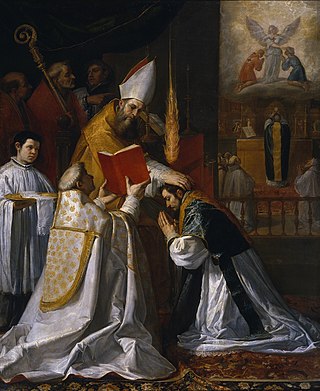
In certain Christian denominations, holy orders are the ordained ministries of bishop, priest (presbyter), and deacon, and the sacrament or rite by which candidates are ordained to those orders. Churches recognizing these orders include the Catholic Church, the Eastern Orthodox, Oriental Orthodox, Anglican, Assyrian, Old Catholic, Independent Catholic and some Lutheran churches. Except for Lutherans and some Anglicans, these churches regard ordination as a sacrament.

A deacon is a member of the diaconate, an office in Christian churches that is generally associated with service of some kind, but which varies among theological and denominational traditions.
Subdeacon is a minor order of ministry for men in various branches of Christianity. The subdeacon has a specific liturgical role and is placed below the deacon and above the acolyte in the order of precedence.

An acolyte is an assistant or follower assisting the celebrant in a religious service or procession. In many Christian denominations, an acolyte is anyone performing ceremonial duties such as lighting altar candles. In others, the term is used for one who has been inducted into a particular liturgical ministry, even when not performing those duties.

A surplice is a liturgical vestment of Western Christianity. The surplice is in the form of a tunic of white linen or cotton fabric, reaching to the knees, with wide or moderately wide sleeves.
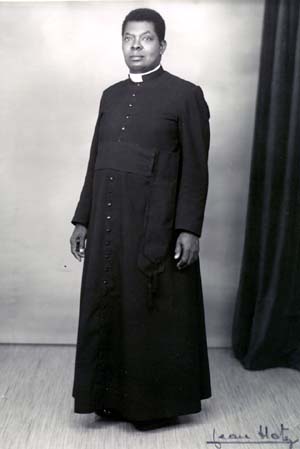
The cassock, also called soutane, is a Christian clerical clothing coat used by the clergy and male religious of the Oriental Orthodox Churches, Eastern Orthodox Church and the Catholic Church, in addition to some clergy in certain Protestant denominations such as Anglicans and Lutherans. "Ankle-length garment" is the literal meaning of the corresponding Latin term, vestis talaris. It is related to the habits traditionally worn by nuns, monks, and friars.
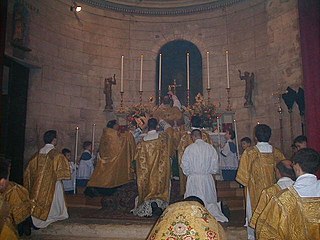
Vestments are liturgical garments and articles associated primarily with the Christian religion, especially by Eastern Churches, Catholics, Lutherans, and Anglicans. Many other groups also make use of liturgical garments; among the Reformed (Calvinist) Churches this was a point of controversy in the Protestant Reformation and sometimes since, in particular during the ritualist controversies in the Church of England in the 19th century.

An altar server is a lay assistant to a member of the clergy during a Christian liturgy. An altar server attends to supporting tasks at the altar such as fetching and carrying, ringing the altar bell, helping bring up the gifts, and bringing up the liturgical books, among other things. If young, the server is commonly called an altar boy or altar girl. In some Christian denominations, altar servers are known as acolytes.
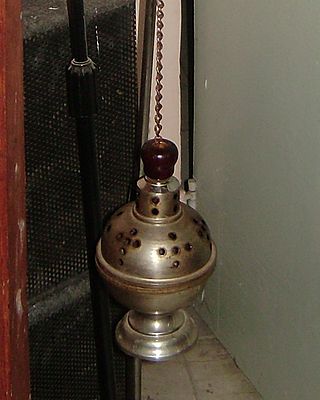
A thurible is a metal incense burner suspended from chains, in which incense is burned during worship services. It is used in Christian churches, including the Roman Catholic, Eastern Orthodox, Assyrian Church of the East and Oriental Orthodox, as well as in some Lutheran, Old Catholic, United Methodist, Reformed, Presbyterian Church USA, and Anglican churches. In Roman Catholic, Lutheran, and Anglican churches, the altar server who carries the thurible is called the thurifer. The practice is rooted in the earlier traditions of Judaism dating from the time of the Second Jewish Temple.

In some Christian denominations, a reader or lector is the person responsible for reading aloud excerpts of scripture at a liturgy. In early Christian times the reader was of particular value due to the rarity of literacy.

A sacristan is an officer charged with care of the sacristy, the church, and their contents.
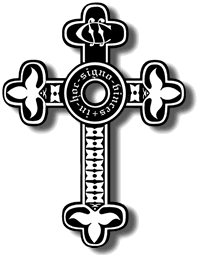
The Society of the Holy Cross is an international Anglo-Catholic society of male priests with members in the Anglican Communion and the Continuing Anglican movement, who live under a common rule of life that informs their priestly ministry and charism.
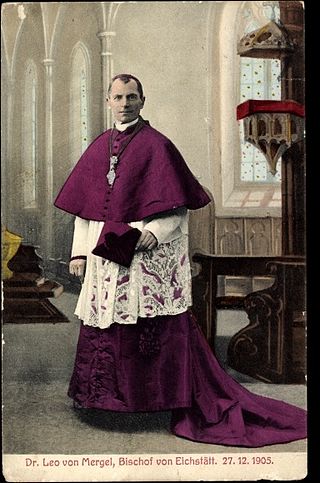
Choir dress is the traditional vesture of the clerics, seminarians and religious of Christian churches worn for public prayer and the administration of the sacraments except when celebrating or concelebrating the Eucharist. It differs from the vestments worn by the celebrants of the Eucharist, being normally made of fabrics such as wool, cotton or silk, as opposed to the fine brocades used in vestments. It may also be worn by lay assistants such as acolytes and choirs. It was abandoned by most of the Protestant churches that developed from the sixteenth-century Reformation.
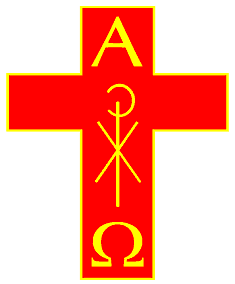
The Society of Catholic Priests (SCP) is a religious society of clergy in the Anglican Communion which draws its membership from Anglicans who consider themselves a part of the liberal Anglo-Catholic tradition.

The Mass is the central liturgical service of the Eucharist in the Catholic Church, in which bread and wine are consecrated and become the body and blood of Christ. As defined by the Church at the Council of Trent, in the Mass "the same Christ who offered himself once in a bloody manner on the altar of the cross, is present and offered in an unbloody manner". The Church describes the Mass as the "source and summit of the Christian life", and teaches that the Mass is a sacrifice, in which the sacramental bread and wine, through consecration by an ordained priest, become the sacrificial body, blood, soul, and divinity of Christ as the sacrifice on Calvary made truly present once again on the altar. The Catholic Church permits only baptised members in the state of grace to receive Christ in the Eucharist.

The Anglican ministry is both the leadership and agency of Christian service in the Anglican Communion. Ministry commonly refers to the office of ordained clergy: the threefold order of bishops, priests and deacons. More accurately, Anglican ministry includes many laypeople who devote themselves to the ministry of the church, either individually or in lower/assisting offices such as lector, acolyte, sub-deacon, Eucharistic minister, cantor, musicians, parish secretary or assistant, warden, vestry member, etc. Ultimately, all baptized members of the church are considered to partake in the ministry of the Body of Christ.

The entrance prayers are the prayers recited by the deacon and priest upon entering the temple before celebrating the Divine Liturgy in the Eastern Orthodox Church and those Eastern Catholic Churches which follow the Byzantine Rite.

The development of the ministry of altar server has a long history. In the early Church, many ministries were held by men and women. By the early Middle Ages, some of these ministries were formalized under the term "minor orders" and used as steps to priestly ordination. One of the minor orders was the office of acolyte. Altar servers are a substitute for an instituted acolyte.
This is a glossary of terms used within the Catholic Church. Some terms used in everyday English have a different meaning in the context of the Catholic faith, including brother, confession, confirmation, exemption, faithful, father, ordinary, religious, sister, venerable, and vow.
References
- GSS (no date). About the Guild. Accessed June 15, 2008.
- GSS (2006). Women Priests: A Statement by the General Council. Accessed June 15, 2008.